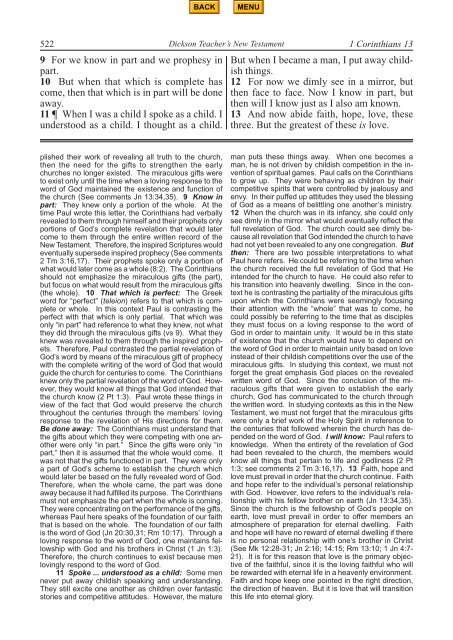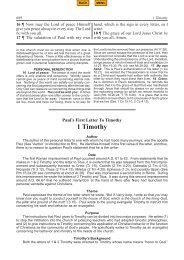1 Corinthians
1 Corinthians
1 Corinthians
You also want an ePaper? Increase the reach of your titles
YUMPU automatically turns print PDFs into web optimized ePapers that Google loves.
522 Dickson Teacher’s New Testament<br />
9 For we know in part and we prophesy in<br />
part.<br />
10 But when that which is complete has<br />
come, then that which is in part will be done<br />
away.<br />
11 When I was a child I spoke as a child. I<br />
understood as a child. I thought as a child.<br />
1 <strong>Corinthians</strong> 13<br />
But when I became a man, I put away childish<br />
things.<br />
12 For now we dimly see in a mirror, but<br />
then face to face. Now I know in part, but<br />
then will I know just as I also am known.<br />
13 And now abide faith, hope, love, these<br />
three. But the greatest of these is love.<br />
plished their work of revealing all truth to the church,<br />
then the need for the gifts to strengthen the early<br />
churches no longer existed. The miraculous gifts were<br />
to exist only until the time when a loving response to the<br />
word of God maintained the existence and function of<br />
the church (See comments Jn 13:34,35). 9 Know in<br />
part: They knew only a portion of the whole. At the<br />
time Paul wrote this letter, the <strong>Corinthians</strong> had verbally<br />
revealed to them through himself and their prophets only<br />
portions of God’s complete revelation that would later<br />
come to them through the entire written record of the<br />
New Testament. Therefore, the inspired Scriptures would<br />
eventually supersede inspired prophecy (See comments<br />
2 Tm 3:16,17). Their prophets spoke only a portion of<br />
what would later come as a whole (8:2). The <strong>Corinthians</strong><br />
should not emphasize the miraculous gifts (the part),<br />
but focus on what would result from the miraculous gifts<br />
(the whole). 10 That which is perfect: The Greek<br />
word for “perfect” (teleion) refers to that which is complete<br />
or whole. In this context Paul is contrasting the<br />
perfect with that which is only partial. That which was<br />
only “in part” had reference to what they knew, not what<br />
they did through the miraculous gifts (vs 9). What they<br />
knew was revealed to them through the inspired prophets.<br />
Therefore, Paul contrasted the partial revelation of<br />
God’s word by means of the miraculous gift of prophecy<br />
with the complete writing of the word of God that would<br />
guide the church for centuries to come. The <strong>Corinthians</strong><br />
knew only the partial revelation of the word of God. However,<br />
they would know all things that God intended that<br />
the church know (2 Pt 1:3). Paul wrote these things in<br />
view of the fact that God would preserve the church<br />
throughout the centuries through the members’ loving<br />
response to the revelation of His directions for them.<br />
Be done away: The <strong>Corinthians</strong> must understand that<br />
the gifts about which they were competing with one another<br />
were only “in part.” Since the gifts were only “in<br />
part,” then it is assumed that the whole would come. It<br />
was not that the gifts functioned in part. They were only<br />
a part of God’s scheme to establish the church which<br />
would later be based on the fully revealed word of God.<br />
Therefore, when the whole came, the part was done<br />
away because it had fulfilled its purpose. The <strong>Corinthians</strong><br />
must not emphasize the part when the whole is coming.<br />
They were concentrating on the performance of the gifts,<br />
whereas Paul here speaks of the foundation of our faith<br />
that is based on the whole. The foundation of our faith<br />
is the word of God (Jn 20:30,31; Rm 10:17). Through a<br />
loving response to the word of God, one maintains fellowship<br />
with God and his brothers in Christ (1 Jn 1:3).<br />
Therefore, the church continues to exist because men<br />
lovingly respond to the word of God.<br />
11 Spoke ... understood as a child: Some men<br />
never put away childish speaking and understanding.<br />
They still excite one another as children over fantastic<br />
stories and competitive attitudes. However, the mature<br />
man puts these things away. When one becomes a<br />
man, he is not driven by childish competition in the invention<br />
of spiritual games. Paul calls on the <strong>Corinthians</strong><br />
to grow up. They were behaving as children by their<br />
competitive spirits that were controlled by jealousy and<br />
envy. In their puffed up attitudes they used the blessing<br />
of God as a means of belittling one another’s ministry.<br />
12 When the church was in its infancy, she could only<br />
see dimly in the mirror what would eventually reflect the<br />
full revelation of God. The church could see dimly because<br />
all revelation that God intended the church to have<br />
had not yet been revealed to any one congregation. But<br />
then: There are two possible interpretations to what<br />
Paul here refers. He could be referring to the time when<br />
the church received the full revelation of God that He<br />
intended for the church to have. He could also refer to<br />
his transition into heavenly dwelling. Since in the context<br />
he is contrasting the partiality of the miraculous gifts<br />
upon which the <strong>Corinthians</strong> were seemingly focusing<br />
their attention with the “whole” that was to come, he<br />
could possibly be referring to the time that as disciples<br />
they must focus on a loving response to the word of<br />
God in order to maintain unity. It would be in this state<br />
of existence that the church would have to depend on<br />
the word of God in order to maintain unity based on love<br />
instead of their childish competitions over the use of the<br />
miraculous gifts. In studying this context, we must not<br />
forget the great emphasis God places on the revealed<br />
written word of God. Since the conclusion of the miraculous<br />
gifts that were given to establish the early<br />
church, God has communicated to the church through<br />
the written word. In studying contexts as this in the New<br />
Testament, we must not forget that the miraculous gifts<br />
were only a brief work of the Holy Spirit in reference to<br />
the centuries that followed wherein the church has depended<br />
on the word of God. I will know: Paul refers to<br />
knowledge. When the entirety of the revelation of God<br />
had been revealed to the church, the members would<br />
know all things that pertain to life and godliness (2 Pt<br />
1:3; see comments 2 Tm 3:16,17). 13 Faith, hope and<br />
love must prevail in order that the church continue. Faith<br />
and hope refer to the individual’s personal relationship<br />
with God. However, love refers to the individual’s relationship<br />
with his fellow brother on earth (Jn 13:34,35).<br />
Since the church is the fellowship of God’s people on<br />
earth, love must prevail in order to offer members an<br />
atmosphere of preparation for eternal dwelling. Faith<br />
and hope will have no reward of eternal dwelling if there<br />
is no personal relationship with one’s brother in Christ<br />
(See Mk 12:28-31; Jn 2:16; 14:15; Rm 13:10; 1 Jn 4:7-<br />
21). It is for this reason that love is the primary objective<br />
of the faithful, since it is the loving faithful who will<br />
be rewarded with eternal life in a heavenly environment.<br />
Faith and hope keep one pointed in the right direction,<br />
the direction of heaven. But it is love that will transition<br />
this life into eternal glory.









